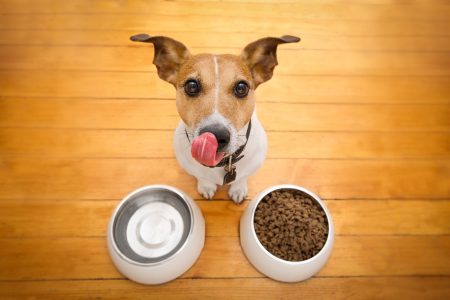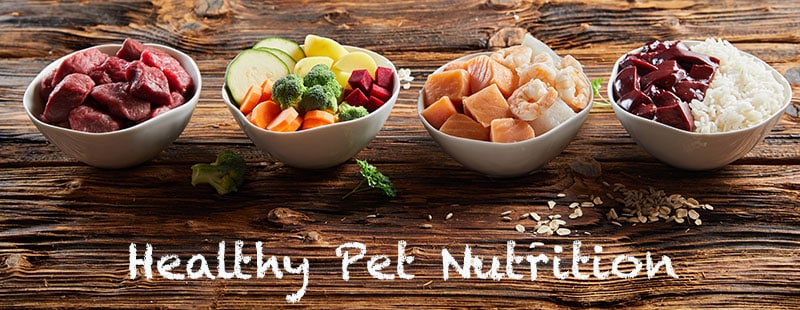Good health requires proper nutrition. A healthy diet for your dog or cat is one of the requirements for a healthier and longer life for your pet. A good time to discuss your pet’s nutritional needs or ask questions about special veterinary diets is during your Preventive Care visits.
Good nutrition starts with making sure that your dog or cat has access to sufficient water for proper hydration. The water bowl should be available to your pet at all times and should be cleaned frequently, with the water changed regularly.
The nutritional requirements of both dogs and cats are different from those of humans, so you cannot simply feed your pet the same food you prepare for your family. Trends in human nutrition such as grain-free of gluten-free diets don’t necessarily translate to healthy feeding practices for pets. There are a number of pet food products on the market from which to choose but paying attention to the nutrients rather than the ingredients is key. Unless your pet has a documented allergy to a certain ingredient, the ingredients don’t matter. It is the nutrients that count.
Essential Nutrients
Proteins: Body tissues are made of proteins. Your dog’s body makes only 13 of the 23 amino acids that are the building blocks of proteins. The other 10 have to come from food. Cats have a couple more that are dietary requirements.
Fats: Fats give your pet energy. They also help keep your pet’s skin and hair healthy. Some important fatty acids for your pet are:
- Linoleic acid
- Omega-6
- Omega-3
Your pet’s body can’t make enough essential fatty acids on its own, so he needs to eat food that has them. Cats digest fats better than carbohydrates.
Carbohydrates: Carbs come from plants. When your pet eats grains and vegetables, they get:
- Sugars
- Starches
- Fiber
Carbs power the tissues in your dog’s body. They also help keep your dog’s intestines healthy. Cats do better with fewer carbs and more protein and fat.
Vitamins and minerals: These are needed for many of the chemical reactions in your dog’s body, such as building bones and keeping them strong.
Your pet can get all the vitamins and minerals he needs in “complete and balanced” pet food, including:
- Vitamin A
- Vitamin D
- Vitamin E
- Vitamin K
- B-complex vitamins
- Calcium
- Phosphorus
Pets don’t have to have vitamin C in their food because their bodies make it. When he eats nutritious food, your pet doesn’t need vitamin or mineral supplements.
To make sure the pet food you buy has the right mix of nutrients, look for the words “complete and balanced nutrition” on the label. Also look for the AAFCO Statement (American Association of Feed Control Officials). We will be writing more about this next week.
Both dry and canned dog food will give your dog good nutrition. For cats, we prefer a combination of dry and canned food. 
Besides knowing what to feed, it is important to know how much. Obesity is the number one nutritional problem that we see, so be careful. The feeding guides on the bags tend to be more generous than necessary for most pets. Also, be aware that not all foods have the same number of calories per cup. Be careful when switching foods not to overfeed or underfeed.
Finally, be aware that certain disease conditions can be managed by using a therapeutic diet. Discuss diet with your veterinarian, and ask if there is a food that might be better for your pet.
